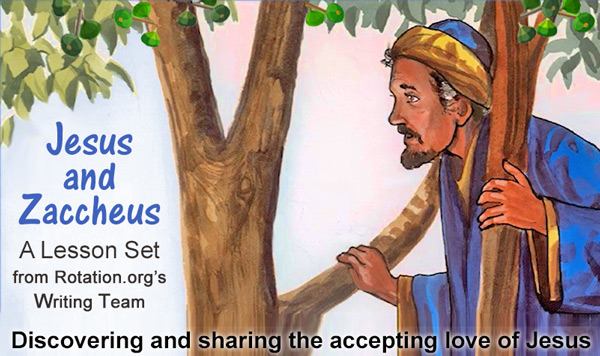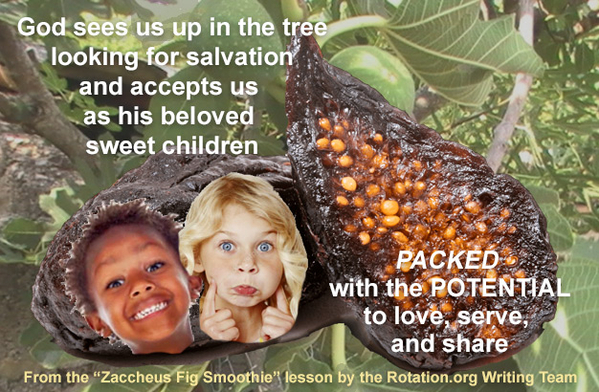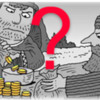Jesus and Zaccheus
Luke 19:1-10
A Rotation.org Writing Team Bible Background
Luke 19's story of Zaccheus—the Jericho tax collector climbing a tree to see Jesus—is one of the most beloved and kid-friendly stories in the New Testament. The image of the little man clinging to a branch above the crowd is both a comical and profound metaphor about looking for salvation and finding it in the love and acceptance of Jesus Christ.

It's also a story that holds many surprises...
One of the first surprises is that the "sycamore" Luke refers to is the common fig tree found throughout the Middle East and Africa. In other words, Zaccheus had climbed a fruit tree! Read more about the tree below.
Another fun surprise in the story is the Greek word "(dia)gongýzō" which Luke uses to describe the muttering or grumbling that went through the crowd when Jesus invited himself to Zaccheus' house. “GONG-GOOD-ZO” is an onomatopoeia—a word that imitates the sound that it describes. It sounds like muttering and grumbling when you say it over and over (which we hope you will do with your students). It appears only twice in the New Testament, both times in Luke to describe a crowd “muttering” about Jesus’ choice of dinner companions (in Luke 15:2 and here in Luke 19:7).
The biggest surprise is when Zaccheus boldly offers to right any wrongs he may* have committed so that Jesus’ reputation is not called into question by dining with a "sinner." Without comment or hesitation Jesus announces, “Today, salvation has come to this house, for he too is a son of Abraham. For the Son of Man came to seek and save the lost” (v. 9-10).
Why did the crowd grumble? Because Jesus surprised them by picking the sinner up in the tree. The crowd thought they knew who was "acceptable" to God and who the Messiah should be spending his time with—and it certainly wasn't a man like Zaccheus. "Who is worthy and what has the Messiah come to do" are two major themes in Luke and throughout the Gospels, and they come together in the story of Zaccheus.
Like those in the crowd that day, many children think "being good" is what earns them God's love and salvation. That is what the Pharisees taught (and have many since then) but it's backward. Luke and the Gospels teach us that Jesus looks for the lost to save them; the lowly in order to lift them up. Salvation is being chosen by Christ. "Being good" is what we do in response to such great love and acceptance. In theological terms, we call God choosing us "justification," and our response to his call "sanctification." In more familiar terms, we call it "unconditional love and grace." It's something Jesus practices time after time—picking "the least likely" to display God's abundant and boundless mercy.
In Matthew 9:10-17, in another "eating with sinners" confrontation, Jesus tells the Pharisees that he is"here to show mercy, not ask for sacrifice." Luke 19 uses the despised tax collector of Jericho to teach that same point.
One of the other surprises about Zaccheus' story is that it comes on the heels of Luke 18, a chapter in which Jesus teaches another crowd about salvation as he makes his way to Jericho. Jesus begins by describing God as a "just judge" bringing salvation to those in need. He then tells the parable of the Pharisee and the Tax Collector praying in the Temple—comparing the tax collector who KNOWS he's a sinner and the Pharisee who thinks he's better than "that tax collector over there." Then Jesus goes on to address who the Kingdom is for and how one gets into it...
“Who then can be saved?” the crowd asked.
And Jesus replied,
“What is impossible with humans is possible with God.”
Just before we read the story of the little man climbing the tree to see Jesus, Luke 18 ends (verses 35-43) with a blind beggar calling out to Jesus as he approaches Jericho. "What do you want from me?" Jesus asks, and the man replies, "I want to see." Sound familiar? Zaccheus wanted to see too and climbed a fig tree so he could. And just like Jesus' pronouncement to Zaccheus, Jesus tells the blind man, "Receive your sight, your faith has saved (healed, restored) you." And the man followed him.
*Was Zaccheus a Thief?
*Did Zaccheus admit he had cheated others?
Double-check your assumptions, memory, Bible translation, and storybook Bible of what's really in Luke 19:8. You may be surprised SOME children's versions plainly call Zaccheus a thief and turn the story into a "bad man made good." But that's not the only way to translate the story! Yet another surprise in this familiar story.
In Luke 19:1-10 the crowd describes Zaccheus as a "sinner and tax collector." Being a tax collector for the Romans MADE Zaccheus a sinner in their eyes because tax collector were often accused of "cheating" by taking too much (a complaint that still goes on today). But the Greek grammar of Zaccheus' response in Luke leaves some interesting wiggle room as to the validity of the crowd's accusations.
In Luke 19:8, Zaccheus literally says "I give half" using the present tense of the verb "give." Does that mean he's already giving half or promising to give half? Several popular translations change Luke's present verb tense to "I WILL give half" to make it a promise in line with the traditional belief that Zaccheus was repenting his sins. But that's not what Luke wrote. "I give half" can be interpreted as a statement of what Zaccheus was "already" doing before meeting Jesus.
Furthermore, Zaccheus seems to suggest that he's already honest when he offers to repay anyone he has defrauded"IF I have defrauded anyone of anything." "IF" raises the question, was Zaccheus one of the honest tax collectors mentioned in Mark 2:15 and like the friends of Matthew mentioned in Matthew 9:9-10?
FYI: "Repaying four-fold" is based on several biblical "formulas" for restitution (see Exodus 22:1). Repayment procedures are also found in Roman law. But again, Luke has Zaccheus saying "if," which is not an admission of guilt but of transparency.
Seeing Ourselves in the Story
Once your students know the story and understand its important salvation theme of acceptance and inclusion, take a deeper dive into the meaning of the story's many teachable metaphors:
- The "trees" we climb to catch a glimpse of Jesus (Sunday School, prayer, etc.) and the "fruit" we produce when we seek Jesus and follow him.
- The "crowds" blocking us from seeing Jesus. (Persons, attitudes, distractions, schedules.)
- The muttering that says we are unworthy and too sinful to be loved by God.
- The bullying and being made to feel like an outcast by religious people and other types of crowds.
- Jesus "picking us" just like he picked Zaccheus out of the fig tree.
- The wrongs we want to make right when we accept Jesus' gift of salvation.
What happens next in the story...
One of the most important parts of Zaccheus' and any story is "what happened afterward." How did being chosen by Jesus change Zaccheus' life? It's a question we need to imagine—a chapter we need to write with our own lives.
What happens when you receive the gift of salvation?
- What does Jesus teach you when he comes to your home? (What do you think Jesus and Zaccheus talked about? What is Jesus talking to you about right now?)
- What changes do you need to make in your life? (What changes do you think Zaccheus made in his life?)
- What will you tell others about the gift you have received? (What do you think Zaccheus told the crowds and his family? How can you show others that you follow Jesus and thus practice "acceptance" to others in his name?
Lesson Objectives
Our first task as teachers is to make sure our students know the story inside and out. Then we can help them understand its main themes (explained in this background)—how things like a “tree” or “crowd” are more than just props in the story—they can represent things in our own faith journey.
Along the way, we begin to see ourselves in the story, as either Zaccheus or perhaps as one in the crowd that day, exploring how we might feel unworthy or like an "outsider," or have mistakenly thought Jesus only saves the "good" people.
And finally, we can begin to think about "what happened afterwards?" How Zaccheus' life and our lives can and should change when we receive the gift of salvation.
Regarding the metaphors:
- The “tree” might be their church, or Sunday School class, or the Bible, or somebody in their life helping them see Jesus.
- The “crowd” might be people in their life who are leading them astray, an attitude that is blocking them from "seeing" Jesus in their life, or it might be the “crowd” of things in their life that are distracting them from growing in Christ and helping others.
- A “stand-up for Jesus” moment might mean righting the wrongs they have done to others, or accepting others who think they are unclean and unworthy of Jesus' love.
- Jesus inviting himself to your home could be a metaphor for continuing the practice of worship, prayer, and scripture study at home, or being an example to your family and neighbors of what it means to follow Jesus. Perhaps someone in your family has brought Jesus to your home -- and it's time to listen carefully to what he has to say to you too.
These are just a few of the possibilities.
Who was Zaccheus?
Luke 19 tells us that Zaccheus was a tax-collector (a “Publican”) which meant he had won a bid to collect taxes in a Roman province, pay them in advance to the Roman government, and either keep any excess in a good year or absorb any losses in a bad year. Needless to say, booing "the taxman" is a time-honored tradition, but the percentage of taxes collected by the Romans and their publicans was far less than what we're used to today (roughly about 3%, source).
Zaccheus was a wealthy Jew living in Jericho, that famous and important city that sits at the crossroads of the region between the Jordan River and Jerusalem, the Dead Sea, and the international trade routes that converged into the main artery known as the Jericho Road leading to Jerusalem. Jericho was a wealthy oasis on the edge of the desert and the winter home of Israel's ruling family.
Jesus called Zaccheus a "son of Abraham" which is a unique phrase meaning "he's part of God's family too!" (Matthew 1:1 gives Jesus the same title.) Throughout his ministry, Jesus confronted crowds and religious authorities over the issue of "who's in and who's out" and "whose side is God on." By accepting Zaccheus and going home with him, Jesus was once again turning the world and its hypocritical opinions upsidedown.
How did he become wealthy? We don't know for sure, but as the "chief" tax collector he was likely from a wealthy family that was well-connected. The effect of saving/converting a well-healed and well-positioned chief tax collector like Zaccheus was a strategic lesson and victory for Jesus that would have reverberated through Jericho long after.
We are told that Zaccheus was “short,” which explains why he had to climb a tree to look for Jesus, But "short" can also be Luke’s way of telling us that Zaccheus was looked down upon in the community and/or was someone you wouldn’t expect Jesus to notice.
A person’s name in the Bible often tells us something about the person’s background, character, or adds a note of humor or poignancy. Zaccheus’ name does all of these. “Zaccheus” is the Greek version of the Hebrew name “Zakai” which many scholars believe comes from the Hebrew word zakak meaning “pure, clean, sinless”—terms usually applied to offerings made in the Temple. When Jesus sees him in the tree, Jesus literally says, "ACCEPTABLE! Hurry down." "CLEAN! I must stay at your house today."
Was Zaccheus one of the tax-collectors who came to be baptized by John in Luke 3? "Even tax collectors came to be baptized, and they asked him (John), “Teacher, what should we do?” He said to them, “Collect no more than the amount prescribed for you.” (Luke 3:12-13) Did Zaccheus know them? Was he one of them? Jericho is about 6 miles from one of the traditional locations where John was said to have baptized people.
Was Zaccheus an acquaintance of Matthew the tax collector who became a disciple of Jesus (Luke 5:27-32)? Or one of the tax collectors Jesus was often accused of consorting with (Matthew 9:9-13)?
According to Luke, Jesus called Zaccheus by name when he saw him up in the tree. Had they met before? Did Zaccheus already know or believe who Jesus was? Or did he experience a flash of divine inspiration to climb the tree?
We will never know for sure what prompted Zaccheus to climb that tree and then come down out of it, but the possibilities remind us that some of us come to Christ in a moment of unexpected conversion, or after a season of preparation, or through the invitation of friends and strangers. Whenever it comes, the first feelings of faith and sensation of being in God's presence often feels like a surprise, followed by acceptance and relief. No matter who you are, what you do or have done, or what others think of you, or what you think of yourself—what really matters is what Jesus thinks of you.
More about grumbling "gong-good-so"
- Who or what do we grumble about in our church?
- What's something that is "unfair" in your school or family or workplace, that makes you grumble?
- What's the problem with "grumbling"?
- Rather than grumble about things you don't understand about God, it is better to invite him into your home for a long talk.
About the Tree
 In Luke 19:4, the tree Zaccheus climbed is called a "Sykomorea" tree ("soo-ka-mah-ray-ah") which is the name of a common fig tree found throughout the Middle East, Africa, and Asia. Spelled "Sycamore" in English and not to be confused with the figless American Sycamore tree, Zaccheus’ sycamore grew large, produced figs several times a year, and were often planted along roads to provide shade and fruit to all.
In Luke 19:4, the tree Zaccheus climbed is called a "Sykomorea" tree ("soo-ka-mah-ray-ah") which is the name of a common fig tree found throughout the Middle East, Africa, and Asia. Spelled "Sycamore" in English and not to be confused with the figless American Sycamore tree, Zaccheus’ sycamore grew large, produced figs several times a year, and were often planted along roads to provide shade and fruit to all.
The prophet Amos tended the figs of the Sykomorea tree. On several occasions, Jesus spoke about fig trees that didn't produce fruit. The fossil record shows that dinosaurs ate sycamore-figs! Learn more about fig trees and their fascinating ancient history, varieties, and importance. There are sycamores still growing today in Jericho. The ripening of the figs of a tended Sykomorea would be hastened by cutting a gash in the fruit with a special tool that also deterred fig wasps from entering the fruit. You might say that Zaccheus’ faith was ripe for pickin! Is yours?
Figs, especially dried ones, are a great metaphor for something or someone that's dried up and perhaps not very good looking, but is actually very sweet and full of seeds that can produce even more "good fruit." Zaccheus probably felt like his faith was beyond picking; that someone like him would never be chosen or acceptable to God. But with God, all things are possible.
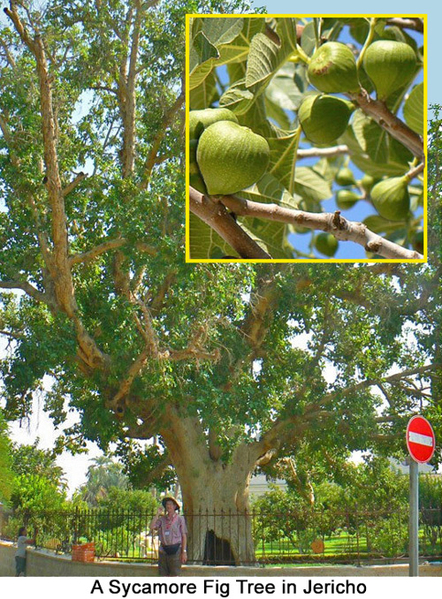
What did Jesus mean when he said, "seek and save the lost"?
Our lesson set doesn't spend a lot of time on the subject of "lost" because there are other famous stories that do, including the Prodigal Son and Parable of the Lost Sheep. "Lost and Found" are major themes in Jesus' teaching. The truth is that everybody is lost and in need of Jesus. In some Bible stories, the lost are looking for Jesus. In others, Jesus is the one doing the seeking of those who don't even know they are lost.
More About the Meaning of Zaccheus' Name
It is incredibly ironic that Zaccheus' name comes from the Hebrew word for "pure, clean, sinless." (Learn more.) From a theological point of view, Zaccheus was certainly just as much a sinner as anyone else, and no doubt sinned after Jesus announced his salvation. To be named or called “sinless” or "pure" doesn't literally mean we stop sinning. Rather, it means our sins are “forgiven” and not counted against us by God. Like many children's names, perhaps Zaccheus was given his name in hope. But the most important name given to him was the one Jesus spoke, "you are a son of Abraham"—you are a member of God's family.
There is an ancient Christian practice of giving someone a new name when they become a Christian. What new name would you give yourself to reflect your new life and hope in Christ?
The Spelling and Pronunciation of Zaccheus' Name
This Bible Background and its associated lessons use "Zaccheus" as the "more correct" or more "helpful" spelling for children. "Zaccheus" is the modern or "Americanized" spelling of the traditional "Zacchaeus" which is used in many translations. The reason for using the simpler spelling is two-fold: (1) Simplicity with children and (2) Pronunciation.
The use of "ae" in many words, such as in "archaeology" and "encyclopaedia," is an academic way of signaling the ancient origin of a word, usually from Latin. Usually, "ae" in Latin is pronounced "ee" as in "key," (such as "caesar"), but not always. It can also be pronounced "ay" as in the word "aegis." (Learn more about pronouncing "ae.")
Using "ae" is not how Luke spelled Zaccheus' name in Greek. Luke spelled it "Zakchaios" which most scholars believe would have sounded like "zak-ee-yos." (Learn more.) This is another example of how vowels in different languages can sound differently and follow different rules.
Any way you spell it or pronounce it, the most important name Zaccheus was given was the one spoken by Jesus—he belonged to the family of God.
Written for the Rotation.org Writing Team by Rev. Neil MacQueen (PCUSA)
Copyright Rotation.org Inc.
For further reading:
- Zaccheus Honest and Tall? ~ Article at MinistryMatters.com
- Seeing Zacchaeus Afresh ~ Article at Workingpreacher.com
- About Tax Collectors and "Sinners" ~Article at BibleOdyssey.org
- From "Te'enah" to Pag to Fig to Ficus: How the Fig Tree Got Its Name

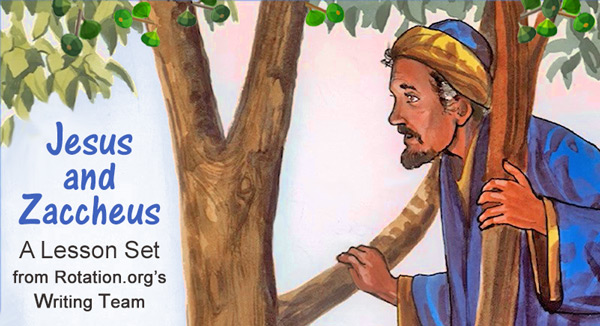 Welcome to the Jesus and Zaccheus Lesson Set!
Welcome to the Jesus and Zaccheus Lesson Set!